Questions are always asked when cataclysmic events arise, events that have great and shattering consequences,but seemingly lack proportionate causes. Why was disaster inevitable once hostilities of the great war of 1914-1918 broke out? People endured this inferno without justifying reasons,and it lead to judgements on human nature that, at best,were difficult and painful. Winston Churchill wrote, ”But there was a strange temper in the air. Unsatisfied by material prosperity the nations turned restlessly towards strife internal or external…Almost one might think the world wished to suffer”. Unfortunately, no single cause, or combination of causes is able to explain WWI. No country involved sought to fill a grand ambition or promote an ideology. It appears that Western civilization, for a hundred years without a major war, was absorbed in a technological and social revolution that turned on itself in a paroxysm of slaughter.
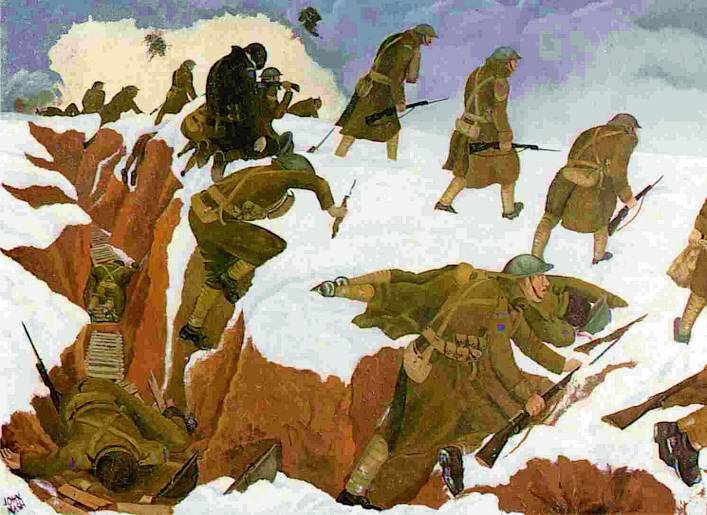
John nash, Over the Top. At the time nash was regarded as an extreme ''modernist'', '' he produced this uncompromising picture which has remained the painter's best known work and one of the most remarkable to come out of the war, revealing as it does, with methodical neutrality, the absurdity of the unprotected offensive and the certainty of not coming back alive. Even more important than the artist's style or his naked realism is the strength of conviction of a picture intended to leave a mark on the memory.''
Two shots were fired in Sarajevo, and thereafter half the world bled for four years. Russia lost nine million men, France lost 15 per cent of its population, the Austo-Hungarian empire suffered seven million casualties etc. ; all to avenge the death of a man , Franz Ferdinand, who demise few particularly regretted. Two shots, at least ten million soldiers killed and twenty million wounded or made prisoner. The real legacy of the war was far less tangible, and beyond simple arithmetic: the impossibility of quantifying despair, chaos,and a drift towards political barbarism which is with us to this day and to which it seems we have not recovered yet.
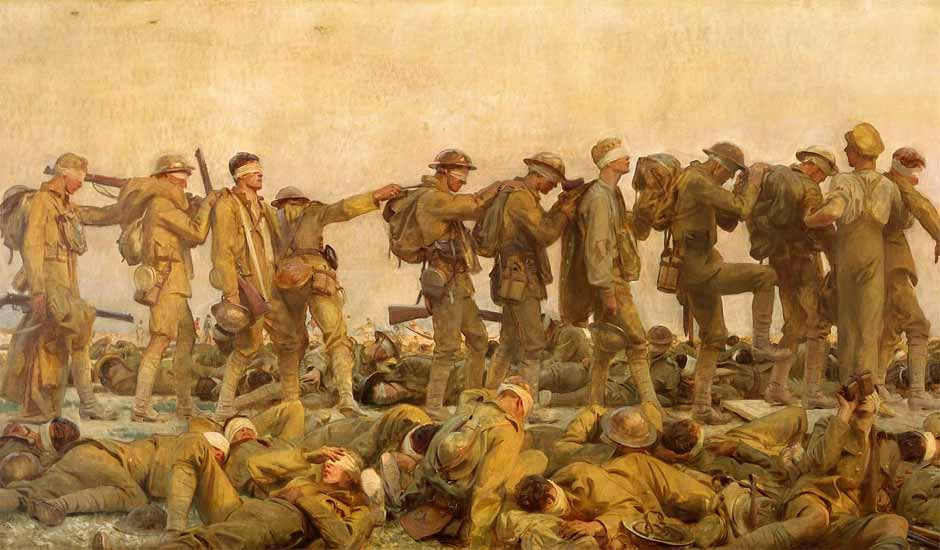
John Singer Sargent. Gassed, 1919. The most terrifying new weapon was gas, whose first major use occured at Ypres, in April 1915, when the Germans released a lethal mist of chlorine that killed, disabled, or panicked hundreds of French and Canadian troops
It was a strange world that died that summer of 1914. For ninety-nine years there had been peace in Europe, apart from the Crimean War. People began to believe that peace was a normal condition. However, after mustard gas, trench warfare, Auschwitz,the London Blitz, Hiroshima, Rwanda, to name only a few, this was an incomprehensible naivete. Disillusionment and a sensibility, a greater consciousness of our condition, is mainly due to the events of 1914-18. ” all of them heroes at large and armed to the teeth! … sniping, plotting, flying, kneeling, digging, taking cover, wheeling, detonating, shut in on earth as in an asylum cell; intending to wreck everything in it, Germany, France, the whole world, every breathing thing; destroying more ferocious than a pack of dogs and adoring their own madness which no dog does, a hundred, a thousand times fiercer than a thousand dogs and so infinitely more viscious! …Clearly it seemed to me that I had embarked upon a crusade that was nothing short of an apocalypse.” ( Louis-Ferdinand Celine )
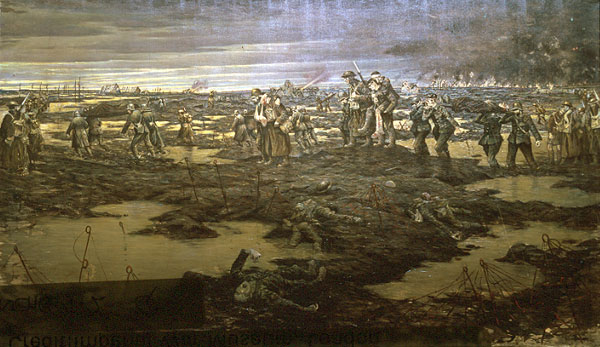
C.R.W. Nevinson, The Harvest of Battle.1917. Grisly scene shows German prisoners carrying their own and British wounded toward the rear
Quite aside from the intellectual shortcomings of the military commanders, of which they were helpless in the face of combat too vast, too impersonal and technical to understand, was the abject poverty of their emotional responses. It seemed no one in command was daunted by the bloodletting in which kill and kill again was the motto. In the nineteenth century, the belief in steady, automatic progress went deep and the progress had been very real in its intellectual and aesthetic endowments and almost extravagant in the sciences and the arts.However, Progress was making demands for social change and the new ”utopian” visions of socialist doctrine were wedging into a fragile social structure unaccustomed to technological progress,mass urbanization and the concept of leisure time. But, the emerging political entanglements were are ”false flag”, a red herring that diverted attention from more fundamental issues of community that the ruling classes were unwilling to confront.
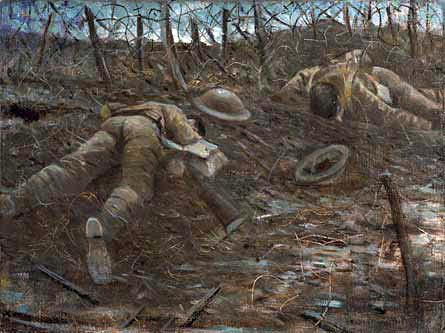
CRW Nevinson. His painting Paths of Glory, in which the stylized angles of Vorticism are abandoned for a more direct approach, (above) was initially banned by the military censors, but Nevinson managed to display it during the war outside of official channels.
According to essayist and thinker Martin Buber, The socialist type of state structure is not by nature, evil in itself any more than the capitalist state. Centralization of command is inherent in both conceptions as nation-state. Both are evil in so far as they prevent the springing-up of the good, the socialist state in that it makes impossible even those remnants of true community which exist in the capitalist state, the capitalist state in that the relations between man and man are indirect and perverted, based on desire for exploitation rather than true togetherness. The remedy for these evils was not the immediate establishment of some utopian super-society but simply the strengthening of the forces of good through the will for genuine relationship and true community.” The surging tides of inexorable world history are slowly pushed back and reversed by the invisible forces working in the souls of men and in the relations between man and man.” A loose form of theocracy where positive change is established through the will of people, based on demands of authenticity and genuine integrity which in its extreme conclusion, becomes one with the will of god. Clearly, not a an acceptable option for Secular or faith based institutions who would lose power. The inference, is that it is better that twenty-five million people should sacrifice their lives instead.
In France, these were the years of the ”Belle Epoque” and artistically, the ”School of Paris”, a name which meant nothing but that in this Paris of the avant-guerre the world of the arts was at home when all the world,s artists came there to learn; Picasso and Juan Gris from Spain, Chagall from Russia, Piet Mondrian from the Netherlands, Man Ray and Max Weber from America and Modigliani from Italy among many others. ” Paris drank the talents of the world, …It is almost as if war had to come in order to put an end to an extravaganza that could not have been sustained at this level”. ( Guillaume Apollinaire )That was Paris. Debussey, Ravel and Stravinsky composed music, Nijinsky raised modern ballet to new heights, as well as the literature of Proust, Fournier and Apollinaire among other men of letters.
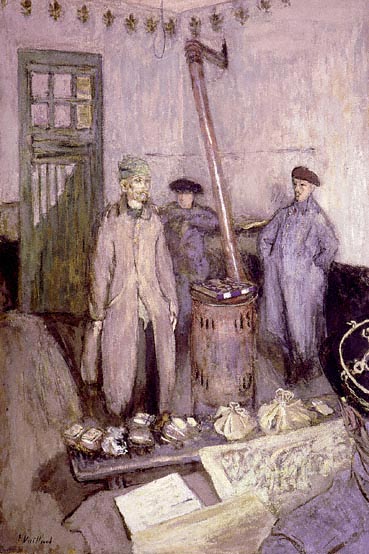
Edouard Vuillard, Interrogation of a Prisoner, 1917. Though there are no corpses in Vuillard's picture,
peaks of the war weariness and complete lack of illusion that was shared by all veteransMartin Buber ( 1878-1965 ) and his partner, Paula Winkler, moved to Berlin in the early 1900’s where the anarachist Gustav Landauer (1870-1919) was among their closest friends. Landauer played an important role in Buber’s life when, in 1916, he criticized Buber for his public enthusiasm for the German war effort. This critique from a trusted friend had a sobering effect, triggering Buber’s turn from an aestheticizing social mysticism to the philosophy of dialogue.
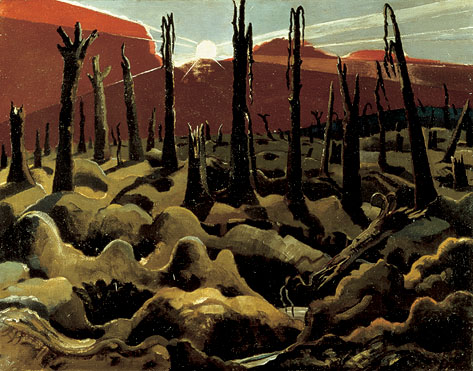
Paul Nash. We are Making a New World. 1918.''The rising sun in ‘We are making a New World’ breaks into No Man’s Land on the Western Front. This is a malleable landscape, constantly reshaped and redrawn by bombardment and attacks. Consequently it is un-mappable, people are excluded, it is ownerless, dead and polluted.''
”This atmosphere of the dualism of truth and reality, idea and fact, morality and politics is that, writes Buber, in which our present age lives. Corresponding to it is the egoistic nationalism which perverts the goal of community by making it an end itself. It is not power itself which is evil, Buber states, in disagreement with the historian Jacob Burckhardt. Power is intrinsically guiltless and is the precondition for the actions of man. It is the will to power, the greed for more power than others, which is destructive. …Not renunciation of power but responsibility in the exercise of power prevents it from becoming evil. This responsibility is lacking in modern nations, for they are constantly in danger of slipping into that power hysteria which disintegrates the ability to draw lines of demarcation. Only in the recognition of an obligation and a task that is more than merely national can the criterion be found which governs the drawing of the distinction between legitimate and arbitrary nationalism.” ( Maurice S. Friedman )
The mature expression of Buber’s concern with realizing the divine through true community is the religious socialism which he developed in the period immediately after the First World War. This development was decisively influenced by the socialism of Buber’s friend Gustav Landauer, the social anarchism of Michael Kropotkin, and the distinction between ‘community’ and ‘association’ in Ferdinand Tönnies’s work, Gemeinschaft undGesellschaft (1887). Community (‘Gemeinschaft’) Buber defines as an organic unity which has grown out of common possessions, work, morals, or belief. Association (‘Gesellschaft’) he defines as a mechanical association of isolated self-seeking individuals. It is an ordered division of society into self-seeking individuals held together by force, compromise, convention, and public opinion. ( Friedman )
Modern western culture, states Buber, is on the way from ‘Gemeinschaft’ to ‘Gesellschaft.’ The mechanical type of social living has replaced the organic. Marxism, the dominant form of modern socialism, desires to overcome the atomization of present-day life and sees itself as the bearer and executor of an evolutionary process. Yet it is nothing other than the process of development from community to association that it is completing. For what today is still left of an autonomy of organic community of wills must, under the working of this tendency, be absorbed into the power of the state. The state will indeed guarantee justice through laws, but the power of the state will be raised to an all-controlling dogma which will make impossible any spontaneous righteousness. Community which once existed universally, and which today exists almost alone in personal life and unnoticed fellowships, will not be able to withstand the all-embracing power of the new socialist state….In this moment of western culture a great longing for community possesses the souls of men. This longing can only be satisfied by the autonomy of the communal cells which together make up true commonwealth. But this autonomy will never be accorded by the present state, nor by the socialist state which will not renounce its rigid centralization to bring about its own decentralization, nor abandon its mechanical form in favour of an organic one. Hence the renewal of communal cells and the joining of these cells into larger communities and commonwealths must depend on the will of individuals and groups to establish a communal economy. Men must recognize that true participation in community demands no less power of soul than participation in a parliament or state politics and is the only thing that can make the latter effective and legitimate. ( Maurice S. Friedman )
…Vienna was another great mongrel city, that, like Paris, drank up talent. The names of the men of talent who walked Vienna’s streets up to the eve of the war are stunning by their brilliance. In the arts these include Gustav Mahler, Bela Bartok, Rainer Maria Rilke, Franz Kafka, Richard Strauss and Stefan Zweig. England was still gilded by the afterglow of the Edwardian age with Kipling, H.G. Wells, D.H. Lawrence, Saki and Robert Graves. Germany was more complicated. Something strange lay beneath the solid prosperity of the Hohenzollern age most apparently a lust for violence, a belief in death and an ominous mystique of war that was pandemic. Even Thomas Mann, spokesman of German humanism, could ask in 1914, ”Is not war a purification, a liberation, an enormous hope? … Is not peace an element in civil corruption?” To be fair, Germany was merely more precocious in expressing a universal European malaise.


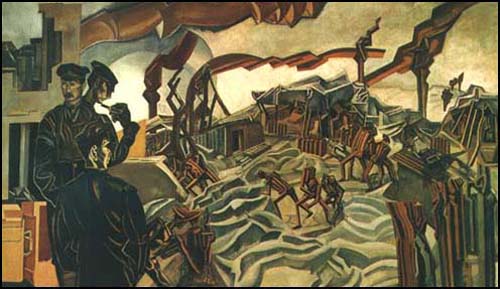
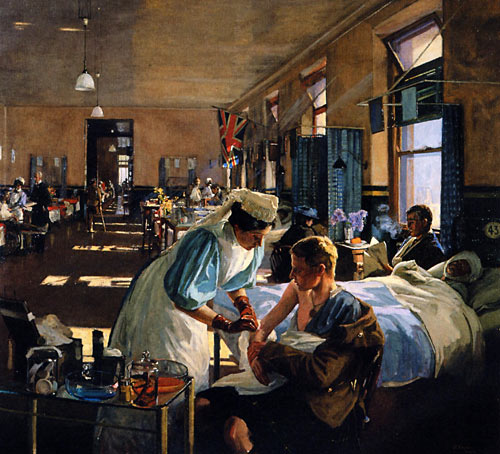



 COMMENTS
COMMENTS